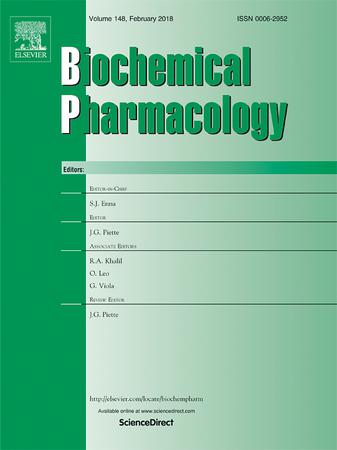靶向成纤维细胞生长因子受体(FGFR)抑制剂在头颈癌中的作用、机制和挑战
IF 5.3
2区 医学
Q1 PHARMACOLOGY & PHARMACY
引用次数: 0
摘要
头颈部鳞状细胞癌(HNSCC)是一种常见的侵袭性癌症,发病率和死亡率都很高。传统的治疗选择,包括放疗、化疗和手术,广泛使用,但其有效性可能不确定。随着癌症治疗研究的发展,分子靶向治疗越来越被认为是治疗恶性肿瘤的有希望的替代方法。成纤维细胞生长因子受体(FGFRs)已被证明是HNSCC进展途径中的重要组成部分之一。本文就fgfr的结构、功能、信号通路、异常改变及其在肿瘤发生发展中的作用进行综述和讨论。我们积累了关于FGFR抑制剂在HNSCC中的体外、体内和临床研究的信息。然而,FGFR抑制剂作为一种癌症治疗的疗效是有限的,这可能是由于对FGFR抑制剂的耐药性。在这篇综述中,我们还讨论了FGFR抑制剂在HNSCC中耐药的潜在机制。通过丰富我们对FGFR抑制剂在HNSCC中的治疗和耐药性的理解,研究人员可能会发现新的治疗靶点或策略,以提高FGFR抑制剂在这种情况下的疗效。本文章由计算机程序翻译,如有差异,请以英文原文为准。

Targeting fibroblast growth factor receptor (FGFR) with inhibitors in head and neck cancers: Their roles, mechanisms and challenges
Head and neck squamous cell carcinoma (HNSCC) is a common and aggressive type of cancer with significant rates of morbidity and mortality. Traditional treatment options, including radiotherapy, chemotherapy, and surgery, are widely used, but their effectiveness can be uncertain. As research in cancer therapies evolves, molecular-targeted therapies are increasingly recognized as promising alternatives for managing malignant tumors. Fibroblast growth factor receptors (FGFRs) have been shown to be one of the essential components in the pathways in the progression of HNSCC. This review aims to summarize and discuss the structure, functions, signaling pathways, abnormal alterations of FGFRs, and their roles in tumorigenesis and development. We have accumulated information from in vitro, in vivo, and clinical studies regarding FGFR inhibitors in HNSCC. However, the efficacy of FGFR inhibitors as a cancer therapy is limited, which may be due to the resistance to FGFR inhibitors. In this review we also discuss the potential mechanisms of FGFR inhibitor resistance in HNSCC. By enriching our understanding of the treatment with and resistance of FGFR inhibitors in HNSCC, researchers may unveil new therapeutic targets or strategies to enhance the efficacy of FGFR inhibitors in this context.
求助全文
通过发布文献求助,成功后即可免费获取论文全文。
去求助
来源期刊

Biochemical pharmacology
医学-药学
CiteScore
10.30
自引率
1.70%
发文量
420
审稿时长
17 days
期刊介绍:
Biochemical Pharmacology publishes original research findings, Commentaries and review articles related to the elucidation of cellular and tissue function(s) at the biochemical and molecular levels, the modification of cellular phenotype(s) by genetic, transcriptional/translational or drug/compound-induced modifications, as well as the pharmacodynamics and pharmacokinetics of xenobiotics and drugs, the latter including both small molecules and biologics.
The journal''s target audience includes scientists engaged in the identification and study of the mechanisms of action of xenobiotics, biologics and drugs and in the drug discovery and development process.
All areas of cellular biology and cellular, tissue/organ and whole animal pharmacology fall within the scope of the journal. Drug classes covered include anti-infectives, anti-inflammatory agents, chemotherapeutics, cardiovascular, endocrinological, immunological, metabolic, neurological and psychiatric drugs, as well as research on drug metabolism and kinetics. While medicinal chemistry is a topic of complimentary interest, manuscripts in this area must contain sufficient biological data to characterize pharmacologically the compounds reported. Submissions describing work focused predominately on chemical synthesis and molecular modeling will not be considered for review.
While particular emphasis is placed on reporting the results of molecular and biochemical studies, research involving the use of tissue and animal models of human pathophysiology and toxicology is of interest to the extent that it helps define drug mechanisms of action, safety and efficacy.
 求助内容:
求助内容: 应助结果提醒方式:
应助结果提醒方式:


